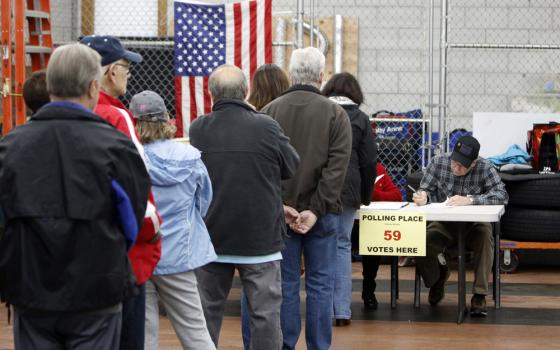The 2018 election is over. We the people have spoken. Voters chose to expand Medicaid, voters rebuked the 2017 Republican tax law, and voters chose a House controlled by Democrats for the first time in eight years. In short, Election Day demonstrated that care for the common good is in the hearts of our people.
Now we have to ask ourselves — what's next?
Many of you are inclined to jump right into the 2020 presidential race and the game of partisan politics, but before focusing on the next election, the new Congress must fix what the last one broke!
In December 2017, the Republicans in Congress passed a sweeping tax law that promises to have devastating effects on our communities by burdening our nation with $1.9 trillion in debt and leading to deep cuts to vital programs. My organization, Network, the lobby for Catholic social justice, and other partners, worked hard to stop these tax cuts from becoming law, but the Republicans in Congress pushed it through without any input or votes from Democrats. This law is bad for our people and needs to be changed. That's why the Nuns on the Bus went on the road this October, visiting 21 states over 27 days before the midterms to hold elected officials accountable for their votes that hurt their constituents.
Let me tell you about some of the people we met on the road who have been hurt by the Republican tax law.
In Detroit, we met with Cass Community Social Services that has bought three blocks of land in their neighborhood and is building beautiful tiny homes for low-income community members as a path to home ownership. Owning a home is an important source of generational wealth, but structural racism has prevented people of color from owning a home. Cass Community Social Services is mending the racial wealth gap — it revitalizes communities and deserves support. They depend on some federal money and tax credits to create this thriving community.
In Savannah, we heard the story of Niema Ross, a young working mother of three who had died that weekend because she couldn't afford the inhaler she needed to breathe. Niema's final post on Facebook was a photo of her empty inhaler captioned with a message asking if anyone had access to more. The community tried to raise money for her medication, but it came too late. Because Georgia hasn't expanded Medicaid, Niema never got her inhaler and her three kids will grow up without a mother. This didn't have to happen. Medicaid expansion included in the Affordable Care Act would have made Niema's inhaler affordable, but Georgian politicians focused on individualism failed Niema and her children. Health care is the right of all people, and Medicaid expansion is crucial to protect that right.
In Cleveland, we visited Lutheran Metropolitan Ministry and heard about their Chopping for Change program, which addresses the intersection of living wages and criminal justice. Lutheran Metropolitan Ministry collaborates with the Ohio prison system to prepare women currently in prison to enter the workforce after they have served their time, and ensures that they have access to a living wage when they reenter the community. While only two years old, Chopping for Change has served 100 women and had a 90 percent graduation rate and a 95 percent non-recidivism rate. We spoke with Tomika Daniels, a mother in the program, who was incarcerated when her daughter was 8 months old. Because of Chopping for Change, Tomika has secured a living wage job that she'll begin as soon as her term is completed. She recently got to cook for her daughter for the very first time. With reasonable revenue, second chance programs that ensure access to a living wage could expand to serve folks all around the country.
All across the country, our people are hurting — but there is hope! Nuns on the Bus has seen so many examples of responsible programs that rely on some tax revenue. Justice-seekers are working together in every community to address the problems of our nation. Community members have found solutions that work, but they need access to reasonable revenue that the Republican tax law is undermining.
We might have lost the tax vote in December 2017, but if last week's election taught us anything, it's that the fight for tax justice is a winning message. As Nuns on the Bus traveled across the country in the lead up to the election, we heard thousands of stories from folks hurt by the terrible tax law. They shared their struggles, their needs and their hopes. And then, they voted.
I am pleased to report that out of 13 Republican members of Congress whose offices that the Nuns on the Bus met with directly, constituents ousted at least eight Representatives because of their voting record. Nuns on the Bus helped to drive Rothfus, Comstock, Coffman, Curbelo, Blum, Roskam, Tenney and Faso out of office.
Voters know that our budget is a moral document that should reflect the values of our nation. They also know that taxes are the way we generate reasonable revenue for responsible programs. We need a tax code for the common good, not one rooted in the unpatriotic lie of individualism preferencing the 1 percent at the expense of the 99 percent. Republicans prioritized a tax break for the wealthiest over the needs of the 100 percent, and they lost the election.
Our new Congress has a job to do: they must undo the damage of the terrible Republican tax law. This is the challenge of the 116th Congress — repair an unjust tax law and thus help heal the rampant inequality in our nation.
[Simone Campbell, a Sister of Social Service, is the executive director of Network Lobby for Catholic Social Justice.]

